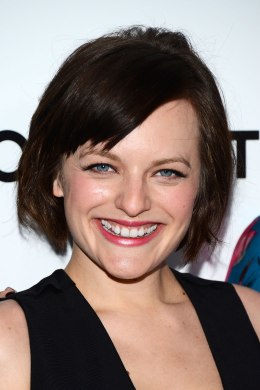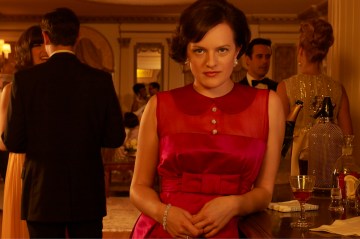
Elisabeth Moss attends the Mad Men Season 6 premiere at DGA Theater on March 20, 2013 in Los Angeles, California.
When we last saw Mad Men‘s Peggy Olson, ten long months ago, she was holed up in a Richmond motel room on her first business trip, with a grin on her face and a glass of wine in her hand. Having rejected Don Draper’s blank-check offer to keep her around, she had taken a job as the copy chief at a rival ad agency. It seemed almost impossible that Peggy would sever all ties with Sterling Cooper Draper Pryce—so much so that some pundits speculated that Peggy wouldn’t stick around for another season.
So, to answer our questions–and allay our fears—we went straight to the person who’s been playing the character for five seasons: Elisabeth Moss. TIME caught up with the busy actress at January’s Sundance Film Festival, where she talked about her role in the Top of the Lake, a seven-part miniseries directed by Jane Campion and currently airing on the Sundance Channel, and, of course, her character on Mad Men, whose sixth season begins this Sunday night on AMC.
TIME: In Top of the Lake, your character Robin Griffin is an inexperienced yet strong woman working as a detective, determined to get to the bottom of a difficult case. Sounds like there are a few parallels to Peggy, who you’ve called the “ultimate feminist.” Is this an important role for you to promote?
Elisabeth Moss: It’s not really a conscious choice, you don’t intend to go attack these issues of misogyny or feminism, but I think as a young woman, it’s difficult to avoid. But if you play a strong independent career woman, you’re gonna run up against that. And I think I’m a bit more suited for those roles than being a housewife or girlfriend. I’m attracted to strong independent characters. Something I didn’t grasp until I started to be asked questions about the parallels between what Peggy deals with in a man’s world, and what Robin deals with in this other world.
You could also apply it to Zoey Bartlet, the character you played on The West Wing. She had to deal with a tricky relationship and being a First Daughter.
For sure, and the danger of that, and the judgment for dating a black man, and would that be different if she wasn’t a woman. I think so much has changed since the 1960s. I would never belittle the strides made by the woman who’ve come before me, but at the same time, men are still men and women are still women. And it’s definitely interesting to look at those problems that still do exist. And Robin, purely by the fact that she’s a young woman, is greeted with a lot of adversity just because of that.
First Daughters face a lot of scrutiny and media attention…
I think there’s a fascination with it, look at Kate Middleton — what do you call them, the Duke and Duchess now? You see the fascination with what she’s wearing and all that. Obama’s daughters are sort of our version of royalty, and it ties into the whole fascination with celebrities’ personal lives in general — what are they buying at the grocery store, what kind of gas are they buying, and what shoes did they wear to the gym.
I had tremendous respect for Jodie Foster’s speech at the Golden Globes. She’s an incredibly talented woman whom I look up to as an actress, but I look up to her personally as well, because she said what everyone was thinking— that it wasn’t always like this. She used to have privacy and have her own life. I understand the fascination as much as the next person. I was just as interested in the whole Kristen Stewart scandal, but it’s important to remember that they are just people and they do have lives. I’ve been pretty lucky, I haven’t had too much experience with my privacy being invaded. But when it does happen, you do have this sense of you’re just a person.
(PHOTOS: Through Don Draper’s Eyes: A Tour of the Time-Life Building of the 1960s)
So let’s look at Mad Men. You’ve got a new gig, and you’re on your first business trip. What’s Peggy’s trajectory looking like in the upcoming season?
Yeah, it’s funny because normally I can’t say anything about the Mad Men season before it starts, but this season I find it’s even more difficult, because I can’t even say where I’m working or what I’m doing or where my job is. I suppose people assume one thing, but I’m so nervous to say anything about anything. I can neither confirm nor deny anything, really. But I will say I’m very happy with where she’s going. It’s been interesting advocating a woman who’s changing and growing up and become stronger. I feel like I haven’t quite found it yet —I’m kind of trying on things for size. She hasn’t quite found who she is yet. That’s been interesting navigating, and making sure she’s still Peggy. She’ll never be Don, she’ll always be herself.
I heard you never knew you were quitting the firm before you got the script that day. Is that [series creator] Matthew Weiner’s new way of doing things?
He did call and let me know what was happening, but it was pretty much right before the script came out. That was actually a cool thing he did. I’m not sure if he did it on purpose, but I assume that he did, so I wouldn’t play like that was coming. But I had a feeling, because it’s in the episodes prior to that episode 11. I think he wanted to make sure I didn’t have an awareness of it, so I could really reach that place when she decides to leave completely, organically and on her own. That’s what I personally love about episodic television.
Actors are always asking: “is it hard not knowing where you’re going?” or “is it hard not knowing what your character is going to do” — and I always think, no, it’s fantastic, because in life, you don’t always know what’s going to happen tomorrow. You don’t know what’s going to happen next week. For an actor, it’s kind of a little bit of a cheat sheet. You’re never in danger of playing anything that hasn’t happened yet. And it allows you to really be in the moment with the character and go through the steps.
Seems like it would make you more genuine as a character.
Yeah. And by the time I got to that episode, I had gone through everything she had gone through: the frustration and the repetition of the old mistakes. So by the time I got there, there was nothing left to do but leave SCDP. So for me, I think it was a great gift that Matt handed me. And it’s one of the great things about episodic TV, to be able to take it step by step.
(MORE: Mortality (and Reefer) In the Air for Mad Men’s Return)
I’m sure it’s difficult not being around Don every day and having a different boss to answer to.
I can’t say whether or not that’s happening. That was a very nice trick question. I applaud you. I have to admit I’ve never got that one before, but I can neither confirm nor deny.
Ah, I got stymied by the script, and the non-disclosure.
And by my general respect for Mr. Weiner.
I found out that you wrote about him a few years ago for our annual TIME 100. You called him “greatest boss a girl could have, but more valuable than that, he’s the greatest friend.” And you’ve said similar things about Jon Hamm. What’s it like working with a team that you consider family?
It’s a great gift, you know. I’ve been really lucky on this show to have not only coworkers and bosses, but friends. It just makes it that much sweeter, when you can talk to your quote-unquote boss – I don’t even think Matt likes when I call him that – as a friend. It’s an amazing thing when you can call him up and say anything you want. It’s a real collaboration. There’s no rules: I said, “if I’m not doing a good job, tell me,” and he says. “if I’m not writing well, tell me.” And it really does work like that. Although very rarely do we ever actually say that to each other — luckily, we haven’t had much of a need.
And it’s the same way with Jon. I had this thought the other day, being in a scene with him, he’s so generous and you feel very safe and he has this incredible ability to step back and let you take the scene and let you be your best, and that’s the sign of a really great actor, when they can listen to you and let you be the best you can be. And I am the best that I am when I’m working with Jon. He does make me a better actor. It’s great. To be able to make money at this incredible thing where you’re also friends with everyone, it doesn’t get better than that.
It’s the dream job for anybody. Going back to the first episode of Mad Men, Peggy makes a really strong impression and never looks back. Did you take the role knowing that Peggy would be this pivotal feminist character?
I don’t know. I didn’t know it was going to be what it became. But I think Matt did. I think he had a plan, but he didn’t tell me. I knew that she was going to be a character, I knew that she was going to be involved, but I didn’t have any aspirations beyond being Don’s secretary. So, for me, to have become such a pivotal character and to have such an arc with so much to do… Like all of us on the show, you should see us, it’s kind of pathetic, we’re just so happy to be in it.
Everyone of us, except Jon, who’s in every scene so he doesn’t have to worry about that—but every single one of us, when we’ve got a scene in the episode, we’re so happy that we’ve got lines and we’re so happy to be there. And it sounds even more cheesy and ridiculous that that feeling has lasted over six seasons. It really hasn’t changed. When someone has a strong episode, everyone goes “Oh you’ve got so much great stuff to do in this one, man,” and we’re all really supportive and I don’t know how we’ve remained this way for six years. Usually casts will turn.
And you’ve all managed to stay close even under so much scrutiny and attention from a very engaged fan base.
It’s a really symbiotic relationship because we really want the audience to be happy and we really want to make the best episodes that we can. And in exchange, the audience has been appreciative and has stuck with us and has continued to support it and love it. And that just makes you want to be better and give them even more and give them even better episodes. It’s a real give and take, and I think we have a relationship with our audience that is very close. We’re doing it for them, that’s it, really. That’s the most important thing.


